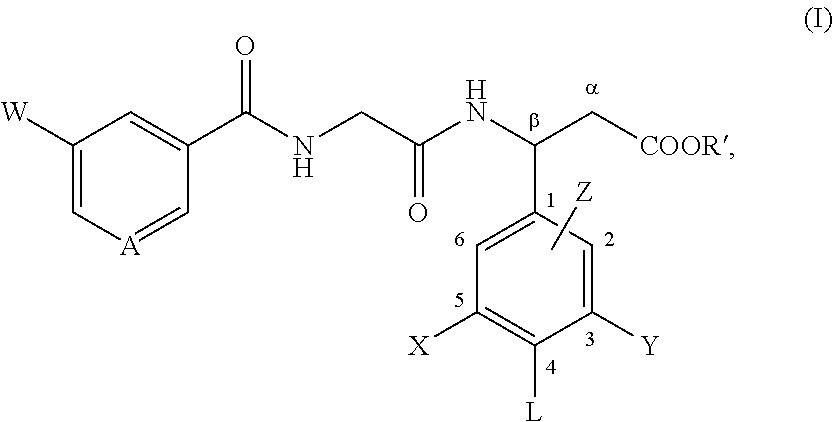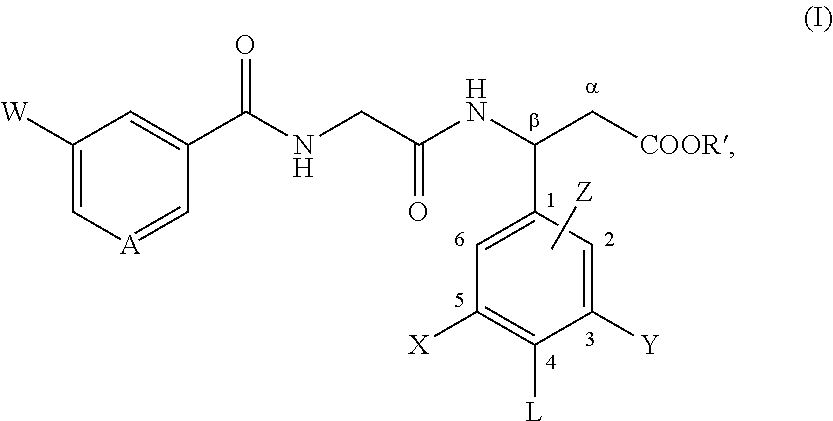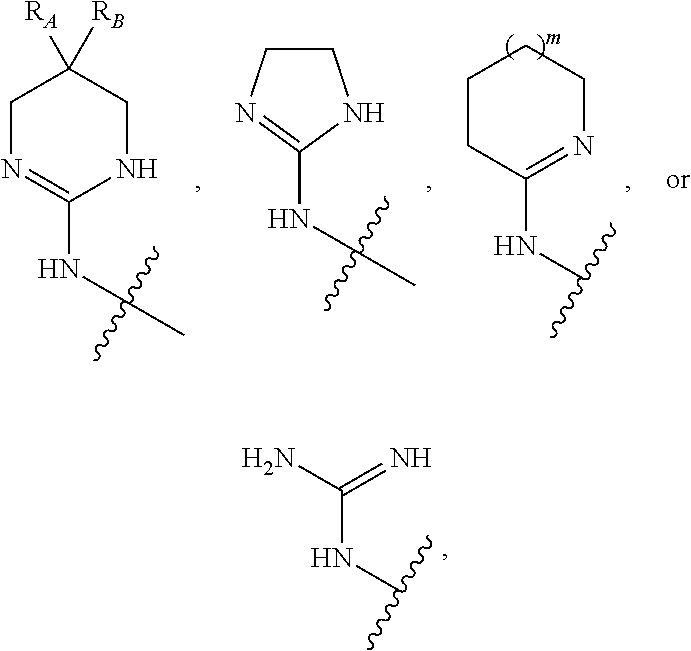Beta amino acid derivatives as integrin antagonists
a technology of integrin antagonists and beta amino acids, applied in the field of beta amino acid derivatives as integrin antagonists, pharmaceutical agents, can solve the problems of being harmful in many disease contexts, designed specifically for binding to a single integrin, and less effective in some applications
- Summary
- Abstract
- Description
- Claims
- Application Information
AI Technical Summary
Benefits of technology
Problems solved by technology
Method used
Image
Examples
example a
Preparation of 3-Hydroxy-5-((5-hydroxy-1,4,5,6-tetrahydropyrimidin-2-yl)aminobenzoic acid
[0258]
[0259]3-Hydroxy-5-((5-hydroxy-1,4,5,6-tetrahydropyrimidin-2-yl)aminobenzoic acid was synthesized according to literature procedures (see Organic Process Research &Development, 8:571-575, 2004, which is incorporated herein by reference).
example b
Preparation of 2-(3-Hydroxy-5-((5-hydroxy-1,4,5,6-tetrahydropyrimidin-2-yl)amino)benzamido) acetic acid
[0260]
[0261]2-(3-Hydroxy-5-((5-hydroxy-1,4,5,6-tetrahydropyrimidin-2-yl)amino)benzamido)acetic acid was prepared according to the following procedure:
Coupling of 3-hydroxy-5-((5-hydroxy-1,4,5,6-tetrahydropyrimidin-2-yl)aminobenzoic acid with glycine ethyl ester
[0262]
[0263]To a suspension of 3-hydroxy-5-((5-hydroxy-1,4,5,6-tetrahydropyrimidin-2-yl)aminobenzoic acid (9.013 g, 35.87 mmol) in a 1:1 mixture of DMF (50.0 mL) and DCM (50.0 mL) was added glycine ethyl ester hydrochloride (5.02 g, 35.95 mmol) and the mixture was stirred at room temperature under nitrogen atmosphere. Neat N,N′-diisopropylcarbodiimide (6.75 mL, 43.60 mmol) was added to above reaction mixture and the mixture was stirred at room temperature overnight to give a colorless suspension. The crude reaction mixture was used as such for the hydrolysis of the above ester.
[0264]
[0265]The above crude reaction mixture was ...
example c
Preparation of 5-Guanidino Benzoic Acid
[0267]
[0268]5-guanidino benzoic acid was prepared according to the following procedure:
Step 1
[0269]
[0270]A mixture of compound 1 (50 g, 0.36 mol) and benzoylisothiocyanate (65.5 g, 0.40 mol) in CH3CN (1.0 L) was stirred at room temperature for 1 h. TLC showed no starting material left. The precipitate was filtered and washed with CH3CN, dried to afford Compound 2 (104 g, 96%) as a light yellow solid.
[0271]TLC information: (DCM / MeOH=10 / 1)
[0272]Material: Rf=0.1
[0273]Product: Rf=0.2
[0274]1H NMR: 400 MHz DMSO δ 12.63 (s, 1H), 11.64 (s, 1H), 8.31 (s, 1H), 8.00-7.98 (d, J=7.06 Hz, 2H), 7.90-7.83 (M, 2H), 7.67-7.65 (M, 1H), 7.57-7.53 (M, 3H).
Step 2
[0275]
[0276]Into a stirred solution of compound 2 (83 g, 0.28 mol) in anhydrous CH3OH (500 ml) was added NaOMe (16.44 g, 0.30 mol) slowly at room temperature. A clear solution resulted in 10 min, and the reaction mixture was stirred for 1 h. The solvent was removed and the residue was triturated with t-BuOMe...
PUM
| Property | Measurement | Unit |
|---|---|---|
| length | aaaaa | aaaaa |
| molecular mass | aaaaa | aaaaa |
| weight | aaaaa | aaaaa |
Abstract
Description
Claims
Application Information
 Login to View More
Login to View More - R&D
- Intellectual Property
- Life Sciences
- Materials
- Tech Scout
- Unparalleled Data Quality
- Higher Quality Content
- 60% Fewer Hallucinations
Browse by: Latest US Patents, China's latest patents, Technical Efficacy Thesaurus, Application Domain, Technology Topic, Popular Technical Reports.
© 2025 PatSnap. All rights reserved.Legal|Privacy policy|Modern Slavery Act Transparency Statement|Sitemap|About US| Contact US: help@patsnap.com



